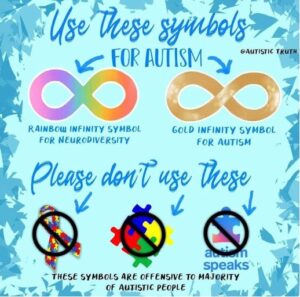Autism is a developmental disability that affects how Autistic people experience the world around them. Autistic people are born autistic and will be Autistic their whole lives. Some people are diagnosed with Autism following an assessment process, but you can be Autistic even if you don’t have a formal diagnosis. Because of myths about Autism, it can be harder for Autistic adults, Autistic girls, and Autistic people of colour to get a diagnosis. But anyone can be Autistic, regardless of race, gender, or age.
There is no one way to be Autistic; every Autistic person experiences Autism differently. There are some things many Autistic people have in common, which you can read about here.
What is Neurodiversity, and how does it relate to Autism?
Neurodiversity is an approach to learning and disability which views the variation in the human brain regarding sociability, learning, attention, mood and other mental functions as normal, and an essential form of human diversity. Neurodiversity aligns with the social model of disability, in that divergence is not seen as disordered/”wrong”; just as there is no “right” gender, race or culture, there is no one “normal” or ”healthy” type of brain or mind or one “right” style of neurocognitive functioning.
Some examples of neurodivergence include:
- Autism
- ADHD
- Intellectual disability
- Global Developmental Delay
- Dyslexia
- Dyspraxia
- Dyscalculia
- Dysnomia
- Tourettes syndrome
- Obsessive Compulsive Disorder
Neurodivergent people live in a world that was built for neurotypical people, and often have numerous experiences of being excluded, criticised, bullied, or misunderstood.
So instead of attempting to “cure” neurodivergent people, therapists/families/supports should seek to help them thrive by finding ways of living in harmony with their neurological dispositions, and to heal from internalised oppression.
What’s the difference between Neurodiversity and Neurodivergence?
Neurodiversity is a paradigm and includes a wide range of people, and does not describe a single person; a person can’t be neurodiverse, because diversity is a property of groups. So instead of referring to a person a “neurodiverse”, we should describe them as neurodivergent.
Should I say “Autistic person” or “person with Autism”?
The majority of Autistic people choose identity-first language (e.g. ‘autistic person’), embracing autism as part of their identity. However, some people prefer to use language that recognises the person first and autism as secondary to their identity (e.g. ‘person with autism’). Similarly to pronouns, it’s a good idea to ask people whether they use identity or person-first language, or simply note how they refer to themselves and follow their lead!
What is ‘high functioning’ or ‘low functioning’ Autism?
While unfortunately still common, functioning language (i.e. ‘high’ or ‘low’) is generally considered offensive, harmful and reductive by the autistic community.
For ‘low functioning’ autistics, the label means their thoughts and feelings are not recognised, respected or considered valid. For ‘high functioning’ autistics, they are expected to act as neurotypical as they can, regardless of the pain that might cause them.
So essentially, functioning labels feed into stereotypes and do not reflect the complexity of Autism (or the person!). Check out these posts on the @theautisticlife instagram re: functioning labels and the Autism spectrum.
What is ‘masking’?
Many autistic people learn (or are sometimes deliberately taught) ways to ‘hide’ aspects of their autism in order to ‘fit in’ and/or avoid (further) negative experiences. This is called ‘Masking’.
Masking can involve doing things that are actually *painful, uncomfortable, or distressing, such as forcing themselves to make eye contact, join in conversations when they feel overwhelmed, make their facial expressions or vocal tone more expressive, not asking questions etc.
Masking can also involve not doing things that bring them joy and/or help them regulate such as stimming, talking about their special interests, saying they need a break/taking a break, leaving an overwhelming situation etc.
Masking is exhausting; it is common for Autistic people who mask all day at school/work to come home and crash/’meltdown’. Masking can be very detrimental to the mental health of Autistic people, and more and more research is exploring this.
*how uncomfortable/painful these things are will of course vary from person to person

Want to learn more? The below are all written/created by Autistic folks:
- About Autism – handy summary of common differences
- Why Everything You Know About Autism Is Wrong – short TedTalk by Autism researcher who is Autistic re: neurodiversity & their experience of being diagnosed with Autism
- The Autism Spectrum is not a linear scale that goes from “less autistic” to “more autistic” – Post on the @theautisticlife Instagram, which is run by autistic people
- 5 ways to challenge systemic ableism during Autism Acceptance Month
- Sensory overload & Processing information – Post on the @the.autisticats Instagram about an autistic person’s experience of going to an ice-cream shop
- Social rules – Post on the @the.autisticats Instagram about how autistic people are often perceived as rude
- Fast Facts About Autism – Short clip that gives an overview of Autism, and was created by an Autistic person
- Autistic MASKING: how do we do it and should we stop? – video explaining masking and its impact
- Communication & Masking – Post on the @the.autisticats Instagram re: neurotypical standards of communication
- Identifying and communicating about emotions – Post on the @the.autisticats Instagram
- Autism and Friendships – video by autistic woman re: her experience of friendships
- High or low functioning autism? Why functioning labels hurt us – video that explores the damaging impact of functioning language (including IQ)
- 9 Things Autistic People Want You to Know About Communication Differences
- Autism, Being Autistic and Acceptance – fantastic, short piece about Autism and Identity
- Hannah Gadsby on getting diagnosed with Autism – great interview with Hannah
- Things not to say to an Autistic Person – autistic people read out questions/statements they’ve had said to them – dispels a lot of myths/stereotypes
- What Hiding my Autism Costs Me – Article by Dr Devon Price (Autistic social psychologist/researcher/lecturer/writer/activist)
- My Autism Checklist – Article by Dr Devon Price, quite long and a great read but if you’re short on time scroll down to the headings “Getting an Autism Diagnosis As An Adult” and/or “My Autism Checklist”
- Unmasking Autism – book by Dr Devon Price which just came out this month!
- We’re Autistic, We’re Human, Get Used to It
- I Have Non-Verbal Autism: Here’s What I Want You To Know
- What is Stimming? – Short video that explains what stimming is and why folks with autism stim
- Stimming – Post on the @the.autisticats Instagram
*Disabled/Disability are not bad words.
Written by Hilary Morgendorffer, a disabled non-Autistic Senior Clinical Psychologist at The Therapy Hub









Recent Comments